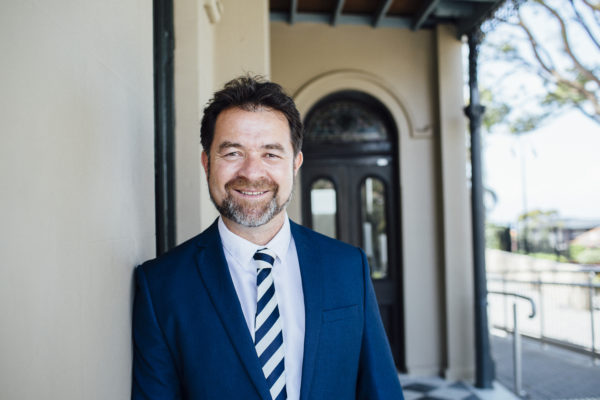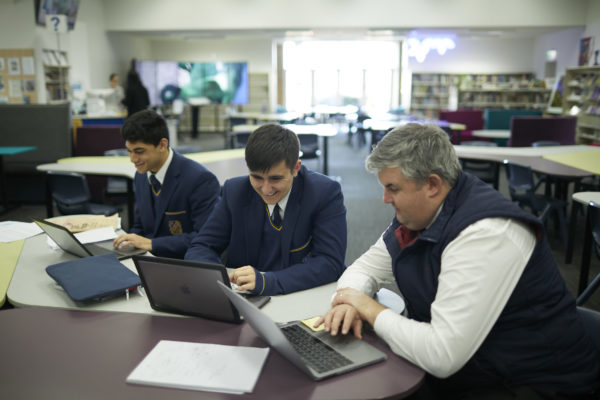
Mr Patrick Brennan, Deputy Principal - Student & Staff Wellbeing
Uniform and Appearance Blitz Days
With the support of the Parents’ Association at Tuesday’s meeting, the Wellbeing Team will be running weekly Blitz Days to ensure your son’s uniform and appearance are in line with what our community expects from a Waverley College student.
Students not in uniform will require a note from home citing a reasonable reason why they are not in full academic uniform.
Your son’s appearance will also be reviewed by the Heads of House to ensure his haircut falls within College policy, and that he is cleanly shaven.
Students were reminded of the importance of uniform and appearance at assemblies today.
Any student not meeting our fair and reasonable expectations will engage in a restorative conversation, and be required to attend a one-hour detention.

A Great Start to 2022
I wish to acknowledge the positive attitudes and choices of your sons in the way they have commenced their school year. Heads of Department have expressed that most students have come to class with an eagerness to learn, and express joy in both Wellbeing groups and classes.
Together we wish to nurture a positive school culture – by working together and expressing pride in and respect for our school community. Both staff and students are looking forward to returning to their normal vertical home groups when restrictions continue to ease over the coming weeks.
Responsibilities
Each member of the community has responsibilities to give our best and show respect by being punctual to class, placing mobile phones in lockers to avoid distraction, wearing the correct academic uniform including a mask indoors, being safe with property and belongings, being prepared for class with a charged laptop and resources, and applying ourselves to our learning with respectful focus and good effort in classwork and homework.

Additional Rapid Antigen Tests
Today your son was issued with additional rapid antigen test kits. From Monday, 28 February, students and staff will only need to take a rapid test if they have symptoms, and will not be required to undertake twice-weekly surveillance testing. Further rapid antigen tests will be distributed upon their delivery to the College.
Age-Appropriate Consent Education
Recently, it was announced that education ministers have agreed that every Australian school will teach age-appropriate consent education within the curriculum for students from Kindergarten to Year 12. This is welcome progress. Such education will include a focus on gendered stereotypes, power imbalance and coercion, with the opportunity to support young people to give or withhold informed consent in their relationships.
This reform will strengthen the dialogue and teaching and learning we have been engaging in with our own students, staff and parents at Waverley College. I commend the work of the PDHPE and Religious Studies teachers, along with curriculum and wellbeing teams, who have listened with students to examine language and content, to better meet the needs of our young people.
Eastern Suburbs School Leaders for Youth (ESSLY)
Each term, I meet with other Deputy Principals within the Eastern Suburbs School Leaders for Youth (ESSLY), as we utilise our network to support teacher and parent education around issues that affect youth within our schools. Waverley College is hosting an event later in the year for parents of our combined schools, which we had postponed last year due to COVID-19. More information to come.
This Month on SchoolTV – Understanding Adolescence
Adolescence is the transitional stage of development that is usually associated with the teenage years. In 2018, the Australian Curriculum Assessment Authority redefined adolescence as affecting young people aged between 10-24 years. During this time, they experience rapid physical, cognitive and psychosocial growth, which affects how teenagers feel, think, make decisions and interact with the world around them.
During adolescence, a child’s brain can be considered as being “under-construction.” The rate at which this progresses will vary depending on the individual and also their gender. As a result, some parents may view adolescence as stressful or difficult. However, it does not need to be. Setting boundaries, implementing consistent monitoring, and maintaining a strong and loving connection, will help families adjust during this time.

It is also an important time to keep the communication lines open through clear and age-appropriate conversations. Speak openly about changes that they are experiencing and be conscious of their mental health, as many of the conditions people confront in adulthood, can begin to manifest in adolescence.
In this edition of SchoolTV, our parents and carers can learn how to guide and best support their young person as they transition through adolescence. We hope you take time to reflect on the information offered in this month’s edition, and we always welcome your feedback.
If you do have any concerns about the wellbeing of your child, please contact your son’s Head of House, Mentor, or seek medical or professional help.
>>> Click here to view this month’s edition of SchoolTV: Understanding Adolescence.
Mr Patrick Brennan
Deputy Principal – Staff and Student Wellbeing
E: pbrennan@waverley.nsw.edu.au



